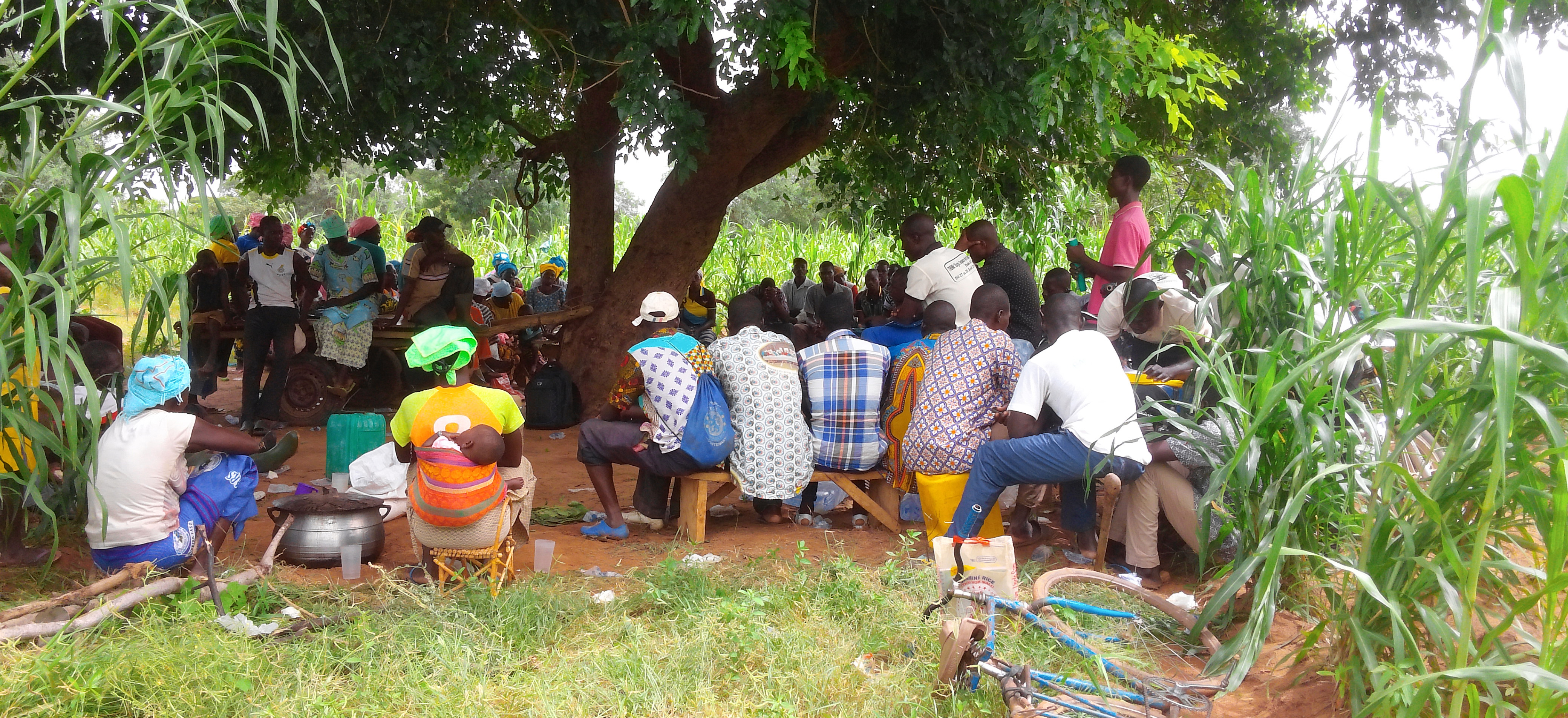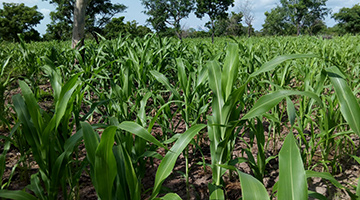Food security in West Africa: a geographical issue
Canada in Burkina Faso
Economic growth
June 14, 2018
Community meeting on organic soil fertilization, Dédougou region. Photo credit: L'ŒUVRE LÉGER
Burkina Faso is a country familiar with food insecurities. The nation is land-locked, situated south of Mali and North of Ghana, with the northern portion located in a region known as the Sahel.
The Sahel is the transition zone between the Sahara Desert and the Savannah. The area is semi-arid with a long, dry season combined with a short rainy season that receives intense but extremely variable rainfall. As you might imagine, this can pose problems for farmers and agricultural productivity.
Improving agriculture from the ground up
 Woman and an ear of sorghum, Kaya region. Photo credit: L'ŒUVRE LÉGER
Woman and an ear of sorghum, Kaya region. Photo credit: L'ŒUVRE LÉGERThe Innovation and Mobilization for Food Security (IMSA) project, led by L'ŒUVRE LÉGER, a Canadian non-government organization (NGO) based in Quebec, plans to increase food security and agricultural resilience in the rural populations of the northern region of Burkina Faso.
IMSA is using a comprehensive from the ground-up approach to the problem and working with three partners based in Burkina Faso. The project plans to strengthen the agricultural value chain from the production to the commercialization process.
What does this mean? The IMSA project has identified three key steps to achieve this goal:
- Sustainably increase the agricultural crops in targeted sectors through agricultural practices, making them more resilient to the effects of climate change.
- Increase the revenues of producers through a better, more efficient agricultural value chain.
- Help organizational partners respond more effectively to the needs of their members, specifically youth and women.
Instead of recommending solutions to resident farmers, IMSA wants to create an enabling environment for targeted populations. This will allow beneficiaries, or as L'ŒUVRE LÉGER prefers to call them potential agents of change, to access information and resources they need to make their own decisions and create a better life for themselves and their community through hard work, innovation and entrepreneurial spirit.
Climate change: a growing concern
The Sahel already sees intense climatic variation under regular circumstances. With the addition of climate change, the region is experiencing increased occurrences of both drought and extreme rainfall. The conditions are becoming more unpredictable, meaning farmers and producers already experiencing food insecurity have even less certainty for the future.
Resilient agriculture
 Sorghum field, Dédougou region. Photo credit: L'ŒUVRE LÉGER
Sorghum field, Dédougou region. Photo credit: L'ŒUVRE LÉGERClimate-resilient crops and agricultural techniques are central to the IMSA project. Collaboration with Canadian agricultural experts has led to sharing of valuable information with the target populations in Burkina Faso.
Some of the techniques taught to farmers in the region include:
- Water and soil conservation: stone barriers, demi-lunes and zai pits
- Introduction of improved seed varieties
- Utilization of organic manure
- Use of (organic) plant protection products
- Fertilizer micro-dosing techniques
- Alternative energy production (biodigesters)
The project targets key crops, increasing yields in cowpea, sorghum, tomato and onion, and introduces small-scale livestock farming to the area.
Key results
 Demonstration of gravity irrigation, Tangaye peasant training centre, Ouahigouya region. Photo credit: L'ŒUVRE LÉGER
Demonstration of gravity irrigation, Tangaye peasant training centre, Ouahigouya region. Photo credit: L'ŒUVRE LÉGERFrom the project start, the three partners in Burkina Faso have reached 24,640 direct beneficiaries of the project.
A major result of the IMSA initiative is the sale of food to the UN World Food Programme (WFP). Two of the three partners have already begun regular sale of produced food to the WFP at competitive rates, earning valuable income for themselves and their community.
The sale of food to the WFP demonstrates the self-sufficiency that IMSA has brought to these regions. The initiative is providing enough food for both the community as well as the excess food sold for profit.
Over 2,700 agricultural producers (61.4% female) have participated in numerous activities realized by the program.
Of these, 1,855 producers (68.5% of the total), have adopted methods of production resilient to climate change.
From April to September 2017, agricultural producers working with the regional partner, Association formation développement ruralité (AFDR), have:
- Increased cowpea yield by 21%, from 350kg/ha to 425kg/ha
- Increased sorghum yield by 38%, from 800kg/ha to 1,100 kg/ha
In total, 107,525 kg of cowpea and 278,300 kg of sorghum were produced by 253 farmers, all of whom had received technical support in their methods of production.
Sustainability: ensuring food security for generations to come
Instead of simply supplying food to those in need, IMSA and other projects that take an innovation-based approach to international development ensure that the results are sustainable and far reaching. These improved approaches to farming in one of the most extremely variable climates on the planet will continue to be practiced and adapted, improving agriculture in the region so long as there are people to benefit from it.
External resources
- Date Modified:



